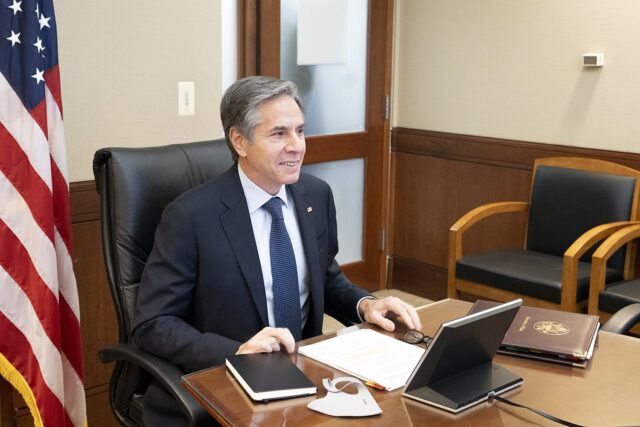
Geopolitical Report ISSN 2785-2598 Volume 28 Issue 9
Author: Silvia Boltuc
Antony Blinken’s visit to Astana stressed Washington’s interests in Central Asia since the region has played a vital role in the Eurasian geopolitical chessboard, especially after the beginning of the Ukraine conflict.
On February 28th, 2023, US Secretary of State Antony Blinken visited Astana (Kazakhstan) and had talks with representatives of Central Asian republics. Blinken’s visit to the capitals of Kazakhstan was his first to the region as the Biden administration’s top diplomat.
Information background
During the visit to Astana, Blinken highlighted that the United States strongly supports President Tokayev’s reform agenda.
The Kazakh President, Kassim-Jomart Tokayev, greeted the top US diplomat and noted that, since establishing US-Kazakh diplomatic relations, Kazakhstan and the United States have built exemplary cooperation in both bilateral and multilateral formats.
Indeed, according to Tokayev, Astana and Washington have strong partnerships in strategic areas such as security, energy, trade and investment. The parties seem to be ready for further development of cooperation.
Geopolitical scenario
Antony Blinken’s visit to Astana came a few days after the first anniversary of the Ukraine conflict, which started on February 24th, 2022. Due to its geographical position and natural resources, Central Asia plays a pivotal role in the Eurasian geopolitical chessboard.
Since the collapse of the Soviet Union, Moscow has considered Central Asia as part of its blizhnee zarubezhe (near abroad) and lebensraum (vital space). Therefore, the Kremlin has attempted to increase its regional influence by strengthening bilateral relations with Central Asian republics and promoting the Eurasian Economic Union (EAEU) and the Collective Security Treaty Organisation (CSTO).
In October 2022, on the occasion of the first “Central Asia – Russia” summit held in Astana, the Russian Federation confirmed its strategy and desire to play a leading role in the region by avoiding any external interference, especially in the political and military fields, and increasing trade and economic cooperation.
Especially since the beginning of the Ukraine conflict and the imposition of Western sanctions against Moscow, Central Asia has become vital for Russia. In this framework, the recent “Russia – Turkmenistan Business Forum”, organised in Ashgabat on January 19th, 2023, revealed the significant interests that the Kremlin has in developing cooperation and partnership with Central Asian republics.
Looking at Kazakhstan, relations between Moscow and Astana have been on and off since the start of the conflict in Ukraine. On the one hand, both Russia and Kazakhstan are EAEU and CSTO members and have a long tradition of diplomatic, political, and economic relations. On the other hand, to avoid the Western sanctions that could have impacted the Kazakh market, in the last year, Astana has attempted to balance its dialogue with Moscow, Brussels, and Washington, demonstrating in several situations its attitude to not align with the Russian strategy.
For instance, on February 27th, 2023, Russian media widely reported that the Government of Kazakhstan adopted a resolution on liquidating the trade mission in Russia. Although the Ministry of Trade of the Republic of Kazakhstan noted that such a decision is connected with the optimisation of the work of government agencies, the liquidation of the Kazakh trade mission in Russia alarmed the Russian authority.
We should also mention China’s rising role in the region in this geopolitical scenario. Indeed, since the launch of the Belt and Road Initiative in 2013, Beijing has also become a key actor in Central Asia by investing in local infrastructural projects to transform the region into a logistic and transport corridor connecting Europe and Asia. Therefore, as a consequence of Beijing’s investments, nowadays, Central Asian republics hugely rely on Chinese monetary funds.
Why does it matter?
After the protests in January 2022, Kazakhstan President Kassim-Jomart Tokayev confirmed its leadership thanks to the new presidential elections organised in November 2022. The Central Asian republic will hold parliamentary elections in March 2023, which might strengthen Tokayev’s leadership and power.
If in domestic politics, it seems that Kazakhstan would not face significant problems after the Government has arrested those people accused of being involved in the January 2022 protest and corruption scandals, in foreign policy, Astana should be able to balance between Russia, the United States, and China.
In this context, on the one hand, Kazakhstan is geographically, politically, and economically linked to Russia since the two countries share the world’s longest continuous land border and are members of CSTO and EAEU. On the other hand, in a changing geopolitical scenario due to the Ukraine conflict and the US-China confrontation, Kazakhstan is promoting a multi-vector foreign policy which looks to the West, especially the United States, to decrease the Russian and Chinese political and financial pressure.



